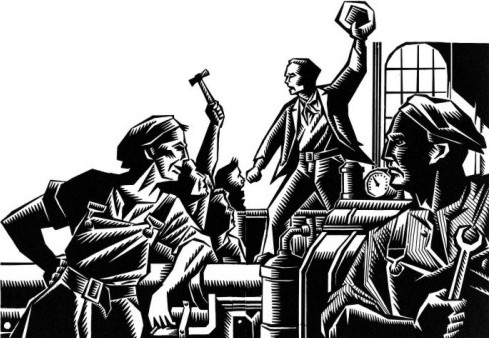Declaration of the Union Rights' Defence Centre
 In employee and employer relations, the latter has greater power by definition. The salary of today and tomorrow depend very much on the employer when the employee and the employer are face to face. However as an individual worker depends on the employer, the employer depends on the team: to get profit any investment has to be supported by labour.
In employee and employer relations, the latter has greater power by definition. The salary of today and tomorrow depend very much on the employer when the employee and the employer are face to face. However as an individual worker depends on the employer, the employer depends on the team: to get profit any investment has to be supported by labour.
Recognition of the inequality of the workers’ and the employers’ power is the basis of labour rights, which try to limit the abuse of power by an employer and let the hired employee have additional protection. Recognition of the ability of workers to equalize their power with the employers by uniting and acting as a team is at the heart of trade unions rights. That's why fundamental trade unions rights include the right to unite, the right to conduct collective bargaining and the right to strike. These rights are enshrined in international agreements and conventions, national constitutions and laws.
And yet we still hear news around the world about the harassment of workers, attacks on trade union activists, arrests, new legal limits on union rights or strikes, lock-outs and dismissals. Greece and Bahrain, Iran and Egypt, Columbia, Peru, Canada, Zambia, Zimbabwe, Korea, Indonesia and Pakistan are on the map of trade unions and workers activists' battles with persecution. It is sad to admit, but most of the countries of our region, the former Soviet Union countries, are also in this list.
And throughout we can here the same argument from the employers, managers and politicians supporting them: strong trade unions, protection from dismissal, pay rises, secure employment and rights in workplace are the signs of labour relations of the last century, which allegedly create obstacles for economic development.
However, economic growth is impossible without an increase in consumer demand, which has the purchasing power of most of society at its core, of workers, which directly depends on the level of salaries and hope for the future. Those who earn more buy more, giving the opportunity for the growth of production of goods and services and therefore to create more jobs. That's why the right to have unions and collective negotiations on salaries is a fundamental, essential right of each worker and the whole society.
Failure to provide trade union rights is the source of growing inequality, poverty, food and environmental problems. Attacks on labour and trade union rights today are at the end of the day, attacks on our future. To protect it we have to have that unique instrument, the organization of employees, which we can set against the growing power of corporations and financial institutions, and neoliberal policies of governments.
Without our collaborative effort food won't grow, plants won't function, transport won't move. We have to have the opportunity to fairly use the shared products of our effort, develop the economy and create the future.
Trade union rights are the key to this.
Back to About the Centre







